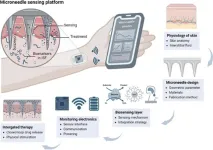Microneedle sensors for dermal interstitial fluid analysis
2024-11-12
(Press-News.org)
The rapid advancement in personalized healthcare has driven the development of wearable biomedical devices for real-time biomarker monitoring and diagnosis. Traditional invasive blood-based diagnostics are painful and limited to sporadic health snapshots. To address these limitations, microneedle-based sensing platforms have emerged, utilizing interstitial fluid (ISF) as an alternative biofluid for continuous health monitoring in a minimally invasive and painless manner.
The team led by Wei Gao from California Institute of Technology providea a comprehensive overview of microneedle sensor technology, covering microneedle design, fabrication methods, and sensing strategy. Additionally, it explores the integration of monitoring electronics for continuous on-body monitoring. Representative applications of microneedle sensing platforms for both monitoring and therapeutic purposes are introduced, highlighting their potential to revolutionize personalized healthcare.
The advancement of microneedle sensing platforms marks a significant leap forward in the field of personalized healthcare and wearable biosensing devices. This review discussed diverse aspects of microneedle sensing technology while highlighting its potential as a daily health monitoring and diagnosis platform. Integrating microneedles with variable sensing mechanisms and miniaturized monitoring electronics offers minimally invasive and continuous detection methods for various biomarkers in ISF. With the significant advances in microneedle sensing technology, wearable ISF analyzing devices can potentially replace blood-based gold standard diagnostics in the future.
END
[Attachments] See images for this press release:

ELSE PRESS RELEASES FROM THIS DATE:
2024-11-12
Research by scientists at the University of Sydney has identified a constituent in the cannabis plant that improves sleep.
Their report is the first to use objective measures to show the component, known as cannabinol (CBN), increases sleep in rats.
The study has been published in the leading journal Neuropsychopharmacology.
“For decades, cannabis folklore has suggested that aged cannabis makes consumers sleepy via the build-up of CBN, however there was no convincing evidence for this,” said lead author on the study Professor Jonathon Arnold, ...
2024-11-12
A team of clinicians, scientists, and engineers at Mount Sinai trained a deep learning pose-recognition algorithm on video feeds of infants in the neonatal intensive care unit (NICU) to accurately track their movements and identify key neurologic metrics.
Findings from this new artificial intelligence (AI)-based tool, published November 11 in Lancet’s eClinicalMedicine, could lead to a minimally invasive, scalable method for continuous neurologic monitoring in NICUs, providing critical real-time insights into infant health that have not been possible before.
Every year, more than 300,000 ...
2024-11-11
NEW YORK – November 11, 2024 – The Cardiovascular Research Foundation® (CRF®) proudly announces the appointment of Dr. Jeffrey Popma as Chief Scientific and Strategic Officer. A world-renowned leader in cardiovascular research, Dr. Popma will drive forward pivotal programs and initiatives that will shape CRF’s future and fuel innovation at the CRF® Clinical Trials Center (CTC). His leadership will be instrumental in the development of the recently launched Real-World Data and Outcomes Center, advancing CRF’s commitment to impactful ...
2024-11-11
Larry Seiber, an R&D staff member in the Vehicle Power Electronics group at the Department of Energy’s Oak Ridge National Laboratory, has been elevated to senior member of the Institute of Electrical and Electronics Engineers, or IEEE.
Senior member status requires extensive experience that reflects professional accomplishments. Only 10% of IEEE’s more than 450,000 members achieve this level.
Seiber has conducted decades of cutting-edge research in power electronics and electric machinery. He developed the hardware ...
2024-11-11
People inherit two copies of each gene — one from each parent — an evolutionary fail-safe to ensure survival even when one of them doesn’t function.
For cancer-suppressor genes like BRCA1, researchers have long hypothesized that a single healthy copy could still guard against tumor development. Yet women with one harmful BRCA1 mutation are far more likely to develop breast cancer — a risk traditionally explained by a second mutation that arises later in life, damages the healthy copy of the gene, ...
2024-11-11
AMES, Iowa – In their long strings of nucleotides, DNA molecules hold massive troves of genetic data providing instructions for how living organisms should function – the blueprint of life. How the blueprint is stored, however, impacts how it is read and used.
As cells divide and replicate, DNA strands coiled around proteins – chromatin – are in tightly bundled chromosomes. After division, the chromosomes loosen and chromatin is less compact. How and where the chromatin fiber folds and ...
2024-11-11
Adolescents who meet the recommended guidelines of nine to 11 hours of sleep per day were shown to have a significantly lower risk of hypertension, according to a new study from UTHealth Houston.
Recently published in the Journal of the American Heart Association, the research revealed that adolescents had a 37% lower risk of developing incidents of high blood pressure by meeting healthy sleep patterns, and underscoring the importance of adequate sleep behavior. The research further explored the ...
2024-11-11
How would you summarize your study for a lay audience?
T helper (TH) cells are essential immune cells that help other immune cells function effectively. When activated in response to environmental stimuli, these cells can differentiate into either TH1 cells, which fight against viruses and intracellular pathogens, or TH2 cells, which fight against extracellular pathogens like bacteria and parasites. However, scientists haven’t fully understood whether infected tissue itself has any role in directing the optimal T cell differentiation in response ...
2024-11-11
Current guidelines recommend that pregnant people receive a vaccine against respiratory syncytial virus (RSV)—which typically causes mild, cold-like symptoms in most adults but can be deadly for infants—during weeks 32–36 of pregnancy. New research led by investigators at Mass General Brigham suggests that vaccination earlier in that timeframe, closer to 32 weeks, could provide the best protection for newborns against RSV. The findings are published in the American Journal of Obstetrics & Gynecology.
“Receiving ...
2024-11-11
Surfers could be protected from future shark attacks following new discoveries about how to trick sharks’ visual systems made by Professor Nathan Hart, head of Macquarie University’s Neurobiology Lab, Dr Laura Ryan and colleagues.
Hart, Ryan and their co-authors of a new paper in Current Biology titled Counterillumination reduces bites by Great White Sharks say their work “may form the basis of new non-invasive shark deterrent technology to protect human life”.
These researchers previously discovered that great whites place a high reliance ...
LAST 30 PRESS RELEASES:
[Press-News.org] Microneedle sensors for dermal interstitial fluid analysis




